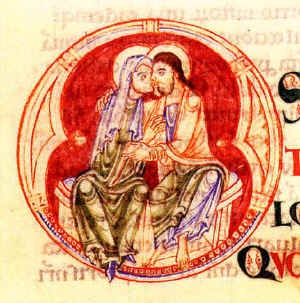
In the Song of Songs, the bride begs the groom, “Kiss me with the kisses of your mouth.” (Song of Songs 1:3) In the plain text of the Old Testament, this is the beginning of an erotic love song; I remember as an undergraduate, a roommate was writing a paper about the “four loves” as they appear in the Bible and was frustrated that there seemed to be no text that illustrated Eros. He was shocked and delighted that he could finish his paper once I introduced him to the Song.
But the Song is so much more than simply an erotic encounter between a bride and groom. It has been read as an encounter between God and the Church as well as a personal encounter between Christ and the believer. (In theology, an “individual” is always cut off from others, grasping and striving only for himself, isolated and alone. Lost. Damned by their own choice. But a “person” and everything about them that is “personal” is in communion with others, is reaching out to encounter the Other. A person is growing and is in the process of being saved; an individual is frozen, static, dead.)
Many have preached on how this “kiss” might be understood in the context of an encounter between Christ and the believer. Bernard of Clairvaux says that God’s “living, active word (Hebrews 4:12) is to me a kiss… an unreserved infusion of joys, a revealing of mysteries, a marvelous and indistinguishable mingling of the divine light with the enlightened mind, which, truly joined to God, is one spirit with him” (1 Cor. 6:17). He goes on to say that “the mouth that kisses signifies the Word who assumes human nature; the nature assumed received the kiss; the kiss however, that takes its being from both the giver and receiver, is a person that is formed by both…. A fertile kiss is not a mere pressing of mouth upon mouth; it is the uniting of God with man.”
This communion of divine and human is the goal of theosis, salvation understood as deification, coming to be by grace everything is Christ is naturally (2 Peter 1). The kiss is the beginning and the goal of this uniting of God and human, the Uncreated and the creature. In the kiss we move from being a collection of individuals, each in their own isolated desert, and become persons who are united with the divine Lover and each other, becoming what we were created to be: a communion of persons who find salvation in our experience of the Other.

